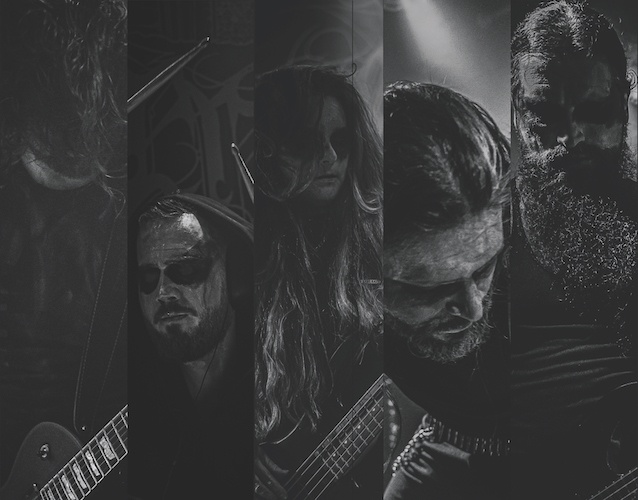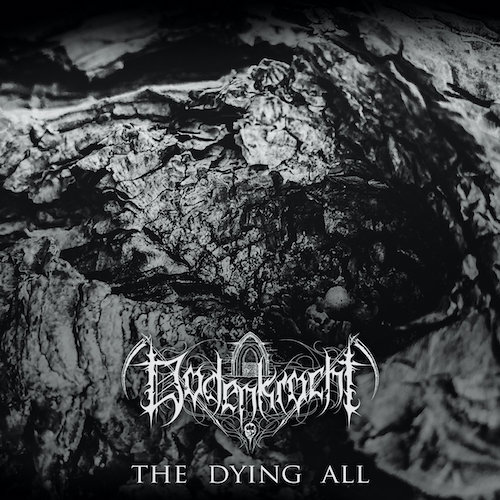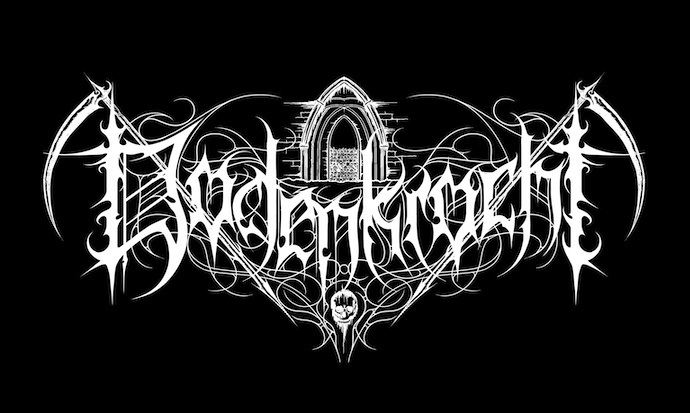
(Comrade Aleks has brought us another very good interview, but this time it’s a rare discussion for him — with the leader of a black metal band, Dodenkrocht, albeit a band who meld elements of doom and black metal. Their latest album The Dying All was released near the end of November by Auric Records and is well worth your time and careful attention.)
Black metal never was my cup of tea. Too fast for me; my metabolism is quite slow to digest it properly. But there are always some exceptions like Dodenkrocht from Netherlands. It was started as a solo project of T. in 2004, but then it turned into a trio on Malebolge Opens (2011) and it has worked as a five-piece act since the Misery Chords (2012) album.
Now, Auric Records has released Dodenkrocht’s fourth full-length work The Dying All, an album partly based on Cormac McCarthy’s devastating novel The Road. We had a nice chat with the band’s founder T. Black metal, covid, apocalypse, black metal….
Salute T! How are you? How do you spend your quarantine?
Greetings Aleksey, we are doing good enough. Since rehearsing in public rehearsal-rooms and live shows were not options, consider the outlines for the new album made. Let’s say I had some time left for new songs.
Despite all of this Auric Records released Dodenkrocht’s fourth full-length, The Dying All. Do you feel it’s the right time, even though there’s no chance to promote the album properly?
We actually started recording the album before this lock-down, but as far as our live routine goes, I don’t think this situation affected Dodenkrocht much. A long time ago we decided that we wanted to keep live shows quite exclusive and that we would only agree to venues that could provide us with the right atmospheric elements on stage. Because of that, our live shows were already quite rare before 2020.
Nonetheless, we wanted to promote this album more than we did before. Some plans to do that were obviously ruined because of the lock-downs, but on the other hand: I think more than ever people are now at home exploring new music. Instead of live-shows, they might spend more attention to albums, so I guess it depends on how you look at it.
What were your requirements for venues? Good old cattle skulls and a few buckets of blood? : )
Hehe, we provide our own paraphernalia 
When and for how long did you record the new songs? I’ve interviewed a few bands who managed to get to studios in time and finished their recordings in February right before everything was closed!
The album was already written a few years ago. When we got in touch with AURIC records and LIQUID AETHER AUDIO, we started planning the recordings for early 2020. All instruments were practically recorded by March. By that time, all communication with the studio was online. LIQUID AETHER did a great job, despite the lock-down.
Did you work with a producer or are you always confident what kind of result you want to achieve with the band?
For The Dying All we put our complete trust in LIQUID AETHER, and that really paid off. The result is a mature and solid doom-black metal sound, exactly the way we wanted it and far better than we could have achieved ourselves. There is no doubt about it that our future releases will also be recorded at LIQUID AETHER.
What were the most difficult parts of The Dying All for you, technical-wise?
I can’t say it is difficult. Initially I wrote everything myself and let the guitarists re-write the lines afterwards so that they were able to give it their own interpretation. I can only state that we are not looking for technical excesses and original chords, although we do appreciate bands who are aiming for these elements. I created DODENKROCHT about 16 years ago with the sole purpose of making atmospheric, eerie and doom-like black metal.

Nowadays black metal is represented in all its variety, from pitch-black old cult followers to modern post-black visionaries. Which elements of black metal do you see as necessary ones in Dodenkrocht?
That is quite a spectrum indeed. When it comes to “taste”, we are all tending to be more on the “pitch black old cult” – side. But since we use lots of doom elements, and since we chose a bombastic mix with our latest album, I can imagine that this album lands somewhere in the middle of this, with one leg, and outside the black metal genre with the other.
What are your doom influences? It has a lot of variations, and it always has. There’s a good gap between Asphyx and My Dying Bride as well as between Candlemass and Trouble.
It’s hard to name bands for me, from the black and doom side. The slow and mid-tempo rhythms, the climaxes of these parts, the synths we use here, the body used in the mix, the funeral atmosphere we try to create between the faster parts, we use this from the doom genre.
A lot of extreme metal bands use lyrics about mass extinction, Armageddon, and so on. Dodenkrocht tends to these kind of misanthropic lyrics as well, so how do you see the pandemic situation from this point of view?
That’s true, lots of bands use this theme. Our vocalist wrote all the lyrics and he brought quite some nihilism in there as well (also a frequently used theme I guess in doom and black metal). The album’s lyrics are loosely based on The Road, and the recurring theme of the album is a dying world where there is no redemption but in death. On the matter of the pandemic situation, the themes that we use are quite coincidental — the album was written several years ago after all.

The Road is a killer movie, and the book is an even grimmer thing. What movie or book would you choose as a fundament for Dodenkrocht’s next album?
Although the new songs are mostly finished, we do not have a clear lyrical concept for the new album at this point. We have some ideas, but I don’t think it would have anything to do with a book this time. Furthermore, The Dying All is an album with a clear concept, inspired by The Road. The next album also might have a concept, but it could also very well be an album with several themes. Inspiration will come with time.
Dodenkrocht is based in Leiden, South Holland. How much of Holland is in Dodenkrocht?
Actually, only one of us lives in Leiden. The others live near Rotterdam, Utrecht, Venlo, and near Antwerp, so quite scattered throughout the Netherlands/Belgium. The areas we are from are not specific places of inspiration at the moment. There was, however, a time when I did use the area to influence my music. I used to take walks on cold nights through the streets of the old parts of Leiden to soak up inspiration. When the streets are empty, the old city at a winter night gives an eerie vibe. It’s quite abstract with its 17th century buildings, parks, cemeteries, bridges and ports. So I guess it’s only fair to say there is a bit of Holland in Dodenkrocht. Apart from this, the early work sometimes had Dutch lyrics.
If we take the first three tracks from the album and read the lyrics of ‘God Never Spoke’, ‘Orphans of the Void’, ‘And the Abyss Was Silent’, then we’ll see that you tend to use imagery of children in your texts. Same with the ‘Before the Grey’ song. Do you see this image as the most expressive considering your message?
Children are innocent. It emphasizes the darkness of it all. A child’s innocence is a good contrast to an unforgiving world. In “And the Abyss Was Silent” the opening sentence “Their [infants] mournful cries echo in the silence. Betrayed by the light” explains this.
Lots of us are growing up with the message that all is fine, and we are fed one fairytale after the other. But when it comes to death: none is spared. Especially in “Orphans of the Void” the orphans emphasize the inheritance of the darkness that is left.
By the way, how would you sum up Dodenkrocht’s message?
We observe, we choose a subject for a release, and we work this out in music. There is one baseline in our concepts and that is Death, from the very start of this band. It is a fascinating concept and very broad. We leave having a message up to other bands.
You recorded the debut album Malebolge Opens as a trio, and now Dodenkrocht is a five-piece act. How much does the extended lineup influence your vision or perception of Dodenkrocht?
It works out way better with them. The guitarists only strengthen the band. They bring more ideas that fit in right, they bring lots of creativity. And they have better guitar playing skills than I have, so they also make the riffs I write better, more tight and played with a lot more skill. Concept-wise, nothing changed: The main concept still stands after 16 years and I can tell you that it stays that way.
Thanks for the interview T! Here’s one final question: what are your plans considering Dodenkrocht for what’s left of 2020?
Thank you too Aleks! The album just got released and there are only a few months left as I write this, so now we will be preparing for 2021. We have plans to get more on stage than normal that year. Other than that, we are working on other releases as well. More info on these will follow in 2021, but it’s clear that we won’t sit still.
